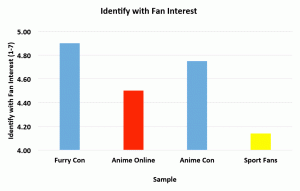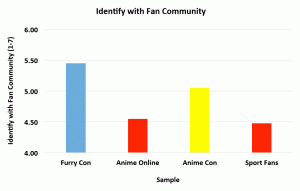Social psychologists who study fan groups make a distinction between two related concepts: fandom and fanship. Fandom refers to a person’s identification with others who share a similar interest to them. In contrast, fanship refers to the extent to which a person identifies with an interest in something. To illustrate, we can imagine people who are high or low on these two traits. A sport fan high on fanship but low on fandom may enjoy watching the games, but find little interest in doing so with others. In contrast, a sport fan low on fanship but high on fandom may watch the games with their friends, not for love of the game itself but for love of being a part of the fan community. Far from being a trivial distinction, psychologists have suggested that a person’s fandom and fanship differently predict their attitudes, feelings, and behaviours in different contexts.
To illustrate this distinction, the figure below1 shows how furries responded to three different questions, two of which are presently relevant: how strongly do you identify (on a 1-7 scale) as a furry (fanship), and with other furries (fandom)?
The blue bars, which represent fanship, show that most furries strongly identify with their fan interest (with an interest in furry content). In contrast, while many furries identified strongly with other furries in the fandom (fanship), there was not as significant a peak at the right side of the figure, suggesting that while many furries feel a strong sense of fandom, not all furries feel such strong identification with the fandom as a whole.
That said, studies comparing furries to members of other fandoms show that while furries may be just as big a fan of their fandom’s content as other fans (e.g., convention-going anime fans, top figure), fandom was far more important for furries than for other fandoms (bottom figure), suggesting that the sense of community provided by the furry fandom is a bigger part of furries’ identity than it is for other fans (a figure which is consistent with other data showing that belongingness is an important motivator of participation in the furry fandom.2
Building on our prior work on how the degree to which a furry is a fan of furry content and a member of the furry community can predict a number of attitudes and behaviors, we extended these findings by looking at several new variables.3
One such variable assessed the extent to which furries indicated that being a furry was the strongest interest they had (as compared to other fan interests). In this case, higher fanship scores predicted greater agreement with this item – that furry was your strongest interest. While fandom scores showed a similar trend, the relationship was much weaker – being a member of the fan community was far less strongly associated with furry being one’s biggest (or only) fan interest.
The differences between fandom and fanship were even more pronounced when it came to attitudes toward new members of the fandom. Fanship was associated with more negative attitudes toward new fans – disparaging them for being new and declaring them to be the source of problems within the fandom, for example. In contrast, higher fandom scores predicted just the opposite – a strong reduction in negative attitudes toward new fans. In other words, those whose interest in furry is predominantly driven by an interest in the furry community are more welcome and accepting of newer members. Perhaps not surprising, fandom scores were also similarly associated with an increase in empathy toward others. Those who consider themselves to be “more furry” than others, on the other hand, are more elitist and tend to be opposed to newer members within the fandom, and are not more likely to have empathy toward others.
One way in which fandom and fanship scores did not differ was with regard to spending habits: Both fandom and fanship scores were associated with participants’ estimated likelihood of spending $250 in the next year on their furry-related interest. In other words, whether one is a furry because they are passionate about their interest in furry-themed media or whether they are drawn primarily to the sense of community provided by the fandom has little effect on their willingness to spend money on furry-related activities. It may prove telling, in future studies, to see whether these two measures differ in the extent to which they predict different spending habits (e.g., spending to attend social events versus spending to acquire furry-themed merchandise).
In general, the concept of “fandom” is related to, but distinct from, fanship. Fandom refers to the extent that you engage in your fan interest with a community of other fans (e.g., go to conventions, talk with other fans, share content with other fans). Fanship and fandom tend to be related: People who are high in fanship also tend to be higher in fandom. They are not perfectly correlated, however. This means that some people may be high in fanship but low in fandom (i.e., they love watching a show alone by themselves, but are uninterested in meeting other fans). The reverse is also possible: Some people may be high in fandom, but low in fanship (i.e., they love spending time in fan communities, but have relatively little interest in the shows or content itself).
Analyses suggest that the furries in our sample scored fairly high on both fandom and fanship, but these were not perfectly correlated. As such, it is possible to look at whether fandom and fanship are associated with different outcomes among furries. Analyses revealed the following differences:
- Fanship was associated with stronger feelings of elitism in the fandom (e.g., believing that you were better than newer furries); Fandom was associated with less elitism.
- Fanship was associated with a greater tendency to engage in negative forms of fantasy (e.g., delusion, excess); Fandom was associated with less negative fantasy engagement.
- Fanship was associated with a greater tendency to consider furry to be a fetish for you; Fandom was unrelated to the extent to which furry was considered to be a fetish for you.
- Fanship was unrelated to a tendency to believe that furry was a fetish for other furries; Fandom was associated with a tendency to believe that furry was not a fetish for other furries.
- Fanship was unrelated to the extent to which you believed that the fandom’s public reputation was getting better; Fandom was related to beliefs that the fandom’s public reputation was getting better
- Fanship was associated with lower psychological well-being; Fandom was associated with better psychological well-being




Recent Comments